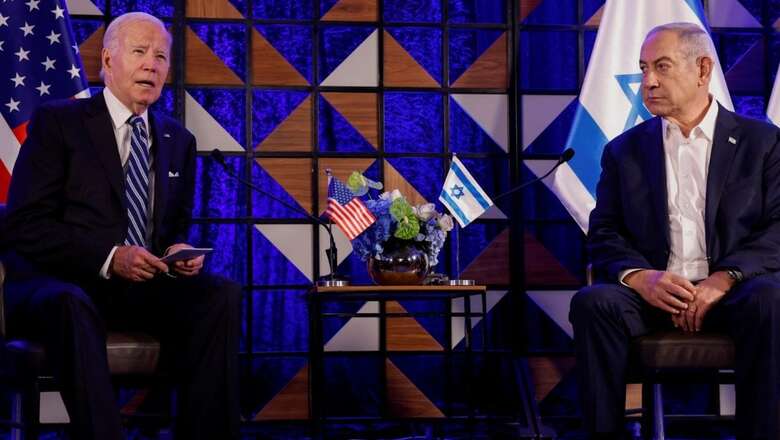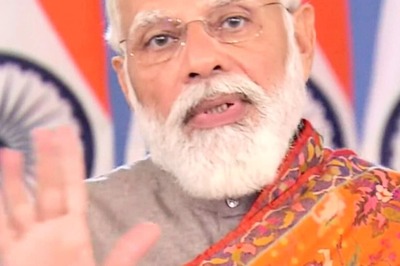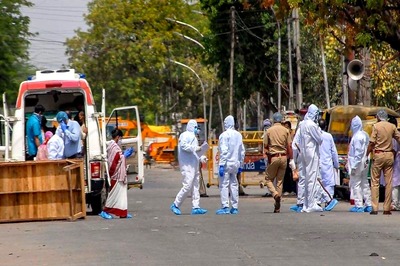
views
In the aftermath of a devastating surprise attack by Hamas, which claimed the lives of over 1,200 people and left 2,700 Israelis injured, Israel has launched a comprehensive response against Gaza. Israel’s Defence Minister, Yoav Gallant, made an unequivocal statement, calling for a complete blockade of Gaza. This response includes a cessation of electricity, food, water, and gas supplies. The goal is to retaliate for the loss of Israeli lives to terrorist attacks.
In this complex geopolitical scenario, how are the self-proclaimed guardians of the rule-based international order and human rights responding? Notably, the leaders of key Western nations have expressed unwavering support for Israel. US President Joe Biden has declared his country’s solidarity with Israel, as has the UK’s Prime Minister Rishi Sunak. The President of France and the Prime Minister of Italy have also voiced their unequivocal backing for Israel. These four nations have even come together to issue a joint statement, pledging their support during this challenging time.
Turning to Canada, a country that has, at times, been a haven for individuals involved in activities against India, it has issued an official statement in support of Israel. Australian Prime Minister Anthony Albanese has likewise affirmed Israel’s right to defend itself following the Hamas attack. European Union (EU) President Ursula Von Der Leyen echoed the sentiment that Israel has the right to self-defence. The sympathetic statements from these governments, without significant criticism of genocidal rhetoric or a comprehensive analysis of the situation, underscore the resolute support that Israel enjoys from the West.
However, it’s crucial to remember that it’s not only Israel that has endured the devastating impact of terrorist attacks. India, too, has faced deadly assaults from various sources, including Islamist terrorists, Khalistani separatists, and secessionist movements in the Northeast. Nevertheless, the Western world’s perception of India’s response to these challenges has often been coloured by a different lens. Exceptions are rare, primarily concerning reactions to the perpetrators when Western nations have also been victims.
This discrepancy in the treatment of India’s actions versus those of other nations becomes especially relevant in the context of international responses to India’s measures to safeguard its sovereignty. Consider the 1985 bombing of an Air India flight by Khalistani terrorists based in Canada, an act that claimed 329 lives. To this day, only one person has been held accountable in this case. During the anti-farm law protests in 2021, which obstructed India’s major transportation routes and took a separatist turn, the Canadian government emphasised human rights concerns to India. Even in cases involving India’s involvement in countering terrorism in Canada, Western nations have not probed the breeding grounds of separatism.
The same Western nations that often criticise India for its assertive measures to protect its sovereignty tend to overlook their own actions in various conflict zones around the world. From Afghanistan and Iraq to Libya and Syria, major Western powers have played a role in destabilising nations and driving them to points of no return. It is essential to recognise the role of the US in instigating the Russia-Ukraine conflict and other instances of destabilisation, such as France’s actions in Niger.
India continually faces international criticism despite employing legal and humane measures to address threats to its national interests. Whether through the utilisation of the Foreign Contribution Regulation Act to regulate foreign funding for destabilising activities or the use of anti-terrorism laws for the safety of its citizens, India is often accused of human rights violations. Foreign governments, who should be familiar with the complexities of India’s challenges, frequently fail to consider the context. This selective condemnation, particularly concerning events in Kashmir and counterterrorism efforts, reveals a biased perspective regarding India’s actions.
The lack of accountability in Western nations is a concern that undermines humanity itself. For instance, the US supported fundamentalist and extremist groups in Afghanistan during the Cold War, only to later wage war against them, leading to the loss of countless lives. In a world guided by justice, those responsible for such actions should be held accountable for the human suffering caused. This absence of accountability fosters hypocrisy and virtue signalling in the Western world.
Western nations often adopt a simplistic approach to wars: their wars are for peace, while any war they do not support is seen as against humanity. This underscores the need for countries in Asia and Africa to hold the West, both politically and culturally, accountable for their actions. Establishing accountability for actions is crucial to creating a fairer and more just world.
In conclusion, it’s essential to acknowledge that all wars, regardless of where they occur, should be subject to the same scrutiny and standards of justice. True accountability for actions is the path toward a better world where fairness and equity prevail.
I must end the article with a modified quote from George Orwell: “All wars are equal, but some wars are more equal than others”.
Harshil Mehta is an independent columnist who writes on international relations, and socio-political affairs; Bhavya Jha is a law graduate, interested in legal affairs, public policy and geopolitics. Views expressed in the above piece are personal and solely that of the author. They do not necessarily reflect News18’s views.




















Comments
0 comment